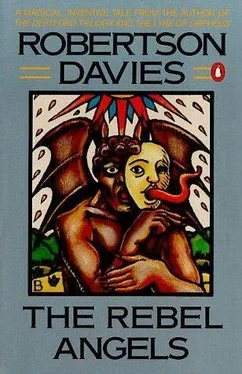Robertson Davies - The Rebel Angels
Здесь есть возможность читать онлайн «Robertson Davies - The Rebel Angels» весь текст электронной книги совершенно бесплатно (целиком полную версию без сокращений). В некоторых случаях можно слушать аудио, скачать через торрент в формате fb2 и присутствует краткое содержание. Жанр: Триллер, на английском языке. Описание произведения, (предисловие) а так же отзывы посетителей доступны на портале библиотеки ЛибКат.
- Название:The Rebel Angels
- Автор:
- Жанр:
- Год:неизвестен
- ISBN:нет данных
- Рейтинг книги:5 / 5. Голосов: 1
-
Избранное:Добавить в избранное
- Отзывы:
-
Ваша оценка:
- 100
- 1
- 2
- 3
- 4
- 5
The Rebel Angels: краткое содержание, описание и аннотация
Предлагаем к чтению аннотацию, описание, краткое содержание или предисловие (зависит от того, что написал сам автор книги «The Rebel Angels»). Если вы не нашли необходимую информацию о книге — напишите в комментариях, мы постараемся отыскать её.
The Rebel Angels — читать онлайн бесплатно полную книгу (весь текст) целиком
Ниже представлен текст книги, разбитый по страницам. Система сохранения места последней прочитанной страницы, позволяет с удобством читать онлайн бесплатно книгу «The Rebel Angels», без необходимости каждый раз заново искать на чём Вы остановились. Поставьте закладку, и сможете в любой момент перейти на страницу, на которой закончили чтение.
Интервал:
Закладка:
Because, you see, I had decided that Maria was a revelation, and such a revelation that I hardly dare to set it down even for my own eyes.
I left parish work and became a scholar-priest because I wanted to dig deep in mines of old belief that were related, as I have said, to those texts which the compilers of the Bible had not thought suitable for inclusion in the reputed Word of God. That was what I had done and my work had attracted some favourable attention. But he who troubles his head with apocryphal texts will not do so long before he peeps into heretical texts, and without any intention of becoming a Gnostic I found myself greatly taken up with the Gnostics because of the appeal of so much that they had to say. Their notion of Sophia seized upon my mind because it suited some ideas that I had tentatively and fearfully developed of my own accord.
I like women, and the lack of a feminine presence in Christianity has long troubled me. Oh, I am familiar with all the apologies that are offered on that point: I know that Christ had women among his followers, that he liked to talk to women, and that the faithful who remained with him at the foot of his Cross were chiefly women. But whatever Christ may have thought, the elaborate edifice of doctrine we call his church offers no woman in authority – only a Trinity made up, to put it profanely, of two men and a bird – and even the belated amends offered to Mary by the Church of Rome does not undo the mischief. The Gnostics did better than that; they offered their followers Sophia.
Sophia, the feminine personification of God's Wisdom: "With you is Wisdom, she who knows your works, she who was present when you made the world; she understands what is pleasing in your eyes, and what agrees with your commandments." Sophia, through whom God became conscious of himself. Sophia, by whose agency the universe was brought to completion, a partner in Creation. Sophia – in my eyes at least – through whom the chill glory of the patriarchal God becomes the embracing splendour of a completed World Soul.
What has all this to do with Maria Magdalena Theotoky, graduate student, under my eye, of New Testament Greek? Maria who, for what I assume was an astonished and certainly not physically ecstatic three minutes, had been possessed by Clement Hollier on his terrible old wreck of a leather sofa? Oh, God, this is where my scholarly madness shows, I suppose, but anybody who concerns himself with the many legends of Sophia knows about the "fallen Sophia" who put on mortal flesh and sank at last to being a whore in a brothel in Tyre, from which she was rescued by the Gnostic Simon Magus. I myself think of that as the Passion of Sophia, for did she not assume flesh and suffer a shameful fate for the redemption of mankind? It was this that led the Gnostics to hail her both as Wisdom and also as the anima mundi, the World Soul, who demands redemption and, in order to achieve it, arouses desire. Well, was not Maria's name Theotoky – the Motherhood of God? Oh, quite useless to tell me that by the Byzantine era Theotoky was a sufficiently common Greek surname, no more to be given special significance than the fairly common English name of Godbehere. But what might be an interesting fact to most scholars was to me a sign, an assurance that my Maria was, perhaps for me alone, a messenger of special grace and redemption.
I suppose that if a man makes legend and forgotten belief his special and devout study he should not be surprised when legend invades his life and possesses his mind. For me Maria was wholeness, the glory and gift of God and also the dark earth as well, so foreign to the conventional Christian mind. The Persians believed that when a man dies he meets his soul in the form of a beautiful woman who is also infinitely old and wise, and this was what seemed to have happened to me, living though I undoubtedly was.
It is a terrible thing for an intellectual when he encounters an idea as a reality, and that was what I had done.
These were the fantasies of my nocturnal man, and all the wordly counsel of the well-set, nicely fixed, book-keeping diurnal man could not beat them down.
So what was I to do? To go backward was base: to go forward an adventure into splendour and terror. But it was forward I must go.
2
Though I say, as lovers always do, that thoughts of Maria filled all my waking hours, of course it was not so. Whatever people outside universities may think, professors are busy people, made even more busy by the fact that they are often unbusinesslike by nature and thus complicate small matters, and by the fact that they either do not have secretaries or share an overdriven and not always very competent secretary with several others, so that they are involved in a lot of record-keeping, and filing and hunting for things they have lost. They are daily asked for information they never had or have thrown away, and for reports on students they have not seen for five years and have forgotten. They have a reputation for being absent-minded because they are torn between the work they are paid for – which is teaching what they know and enlarging what they know – and the work they never expected to come their way – which is sitting on committees under the direction of chairmen who do not know how to make their colleagues come to a decision. They are required to be business-like in a profession which is not a business, lacks the apparatus of a business, and deals in intangibles. In my case the usual professorial muddle was further complicated by clerical odd jobs, including the delivery of occasional sermons at short notice, and putting friends and the children of friends through the Christian rites of passage, such as baptism, marriage, and burial. Having no parish of my own I was the man many people thought of immediately whenever a parson, often in a distant suburb, fell ill with the flu and somebody had to be jobbed in at short notice to turn the crank of the dogma-mill on Sunday morning. But as I was a professor, I could not claim the usual Monday holiday of the clergyman. I am not complaining: I am merely saying that I was a busy man.
Nevertheless, Maria was never far from my thoughts, even when it seemed that the greater part of my small allowance of spare time was demanded by Parlabane and his dreadful novel. I was never sure precisely how near the novel was to completion, because he had so many drafts and sketches and alternative versions, and because I was never shown the full text. He had all the jealousy and suspicion of an author about his work, and I really think he believed me capable of pinching his ideas if I saw too much of them. He had this same bugbear about publishers and seemed to be in what I thought a ridiculous process of selling a novel that nobody was allowed to read in full. "You don't understand," he would say, when I protested. "Publishers are always buying books they haven't seen in a completed form. They can tell from a chapter or so whether the thing is any good or not. You constantly read in the papers about huge advances they have paid to somebody on the promise or mere sketch of a work."
"I don't believe all I read in the papers. But I have published two or three books myself."
"Academic stuff. Quite a different matter. Nobody expects a book of yours to sell widely. But this will be a sensation, and I am confident that if it is brought out in the right way, with the right sort of publicity, it will make a fortune."
"Have you offered it to anybody in the States?"
"No. That will come later. I insist on Canadian publication first, because I want it read by those who are most involved before it reaches a wider public." "Those who are most involved?"
"Certainly. It's a roman à clef as well as a roman philosophique. There will be some red faces when it comes out, I can tell you."
Читать дальшеИнтервал:
Закладка:
Похожие книги на «The Rebel Angels»
Представляем Вашему вниманию похожие книги на «The Rebel Angels» списком для выбора. Мы отобрали схожую по названию и смыслу литературу в надежде предоставить читателям больше вариантов отыскать новые, интересные, ещё непрочитанные произведения.
Обсуждение, отзывы о книге «The Rebel Angels» и просто собственные мнения читателей. Оставьте ваши комментарии, напишите, что Вы думаете о произведении, его смысле или главных героях. Укажите что конкретно понравилось, а что нет, и почему Вы так считаете.












